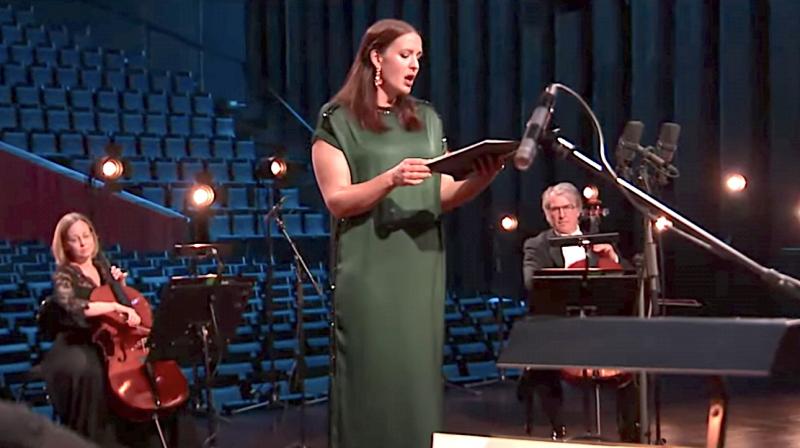Davidsen, Oslo Philharmonic online review - perfect programming, supreme musicality from all | reviews, news & interviews
Davidsen, Oslo Philharmonic online review - perfect programming, supreme musicality from all
Davidsen, Oslo Philharmonic online review - perfect programming, supreme musicality from all
The more-than-promising Norwegian soprano isn't the only star in enthralling 'interludes'

Could there be more tender, tactful or soul-nourishing signs of a new musical normal than these two 45-minute gems? We're nowhere near emulating the kind of live distance concerts members of the Bergen, Oslo and Czech Philharmonics have been offering for some weeks now, but it's vital to hope that we can at some point in the not too distant future.
Especially when the programming has been as thoughtfully done as it has been here, with gravely beautiful openers, the riveting presence of the most compelling of young lyric-dramatic sopranos and the assured, low-key art-concealing-art of outstanding instrumentalists. And in an overall twist, more players will appear in each live concert until it's time to welcome back the full orchestra. Which they can probably do quite soon in Norway; in the UK, well, let's try not to think of that now.
Lise Davidsen was the bait, but in the first concert to feature her the equal star was the Oslo Philharmonic's British principal cellist, Louisa Tuck (pictured below). As she told us in a pre-recorded spoken interlude – the concerts, by the way, are named after the Norwegian word for that, "Mellomspill" – lockdown has left her with time on her hands, so she spent a great deal of it choosing repertoire to arrange for herself and eight colleagues.
 Not the Aria from the fifth of Brazilian composer Villa-Lobos's Bachianas Brasileiras; that's tailor made for the ensemble and soprano – wordless in the outer sections, impassioned with text at the heart of the piece, which found Davidsen giving the slightly plummy delivery she can make with unfamiliar languages, though ravishing in the floated lines throughout. But Tuck honoured her native land with the tongue-in-cheek patriotism of three numbers (just enough) from Henry Wood's Fantasia on British Sea Songs, indelible favourite at the Last Night of the Proms.
Not the Aria from the fifth of Brazilian composer Villa-Lobos's Bachianas Brasileiras; that's tailor made for the ensemble and soprano – wordless in the outer sections, impassioned with text at the heart of the piece, which found Davidsen giving the slightly plummy delivery she can make with unfamiliar languages, though ravishing in the floated lines throughout. But Tuck honoured her native land with the tongue-in-cheek patriotism of three numbers (just enough) from Henry Wood's Fantasia on British Sea Songs, indelible favourite at the Last Night of the Proms.
With the cellists sensibly spaced in an empty hall, there was none of the naff Prommers' footstamping that always tries (and fails) to keep pace with the increasing speeds of the Hornpipe, but plenty of esprit to offset the introspection in much of the programme. And the solo of "Tom Bowling" was, as Tuck must have realised in settling on the choice, a gift for a superb cellist - which she certainly is, but wonderfully collegial, all the same. The nut-brown tones were given a different companion in Svendsen's Romance; fascinating to think that this was going out live at virtually the same time as the players' colleagues at the Bergen Philharmonic were tackling the Swedish composer's Octet.
The eight were put to even more gorgeous use as a magic carpet for Davidsen in three Grieg songs. "Spring", also well known in the composer's melting arrangement for string orchestra, has to be one of the loveliest Lieder ever composed, every inch a match for the most inward inspirations of Schumann, Brahms and Mahler. And while Davidsen had not quite excelled, language and open-vowel wise, in her German selection of an otherwise treasurable Barbican recital before lockdown, here she lived every inflection and invoked the sound of Kirsten Flagstad, with whom she is already being compared (but there are vital differences, too). "A Swan" was no less bittersweet, and "By Rondane," which evokes Grieg's Scottish descent – the i and the e were reversed after his great-grandfather reached Scandinavia following the Battle of Culloden – to an uncanny extent. So three northern lands were evoked in this programme alongside the melancholy-sensual south of the magical prelude.
Watch the first 'Mellomspill' with Lise Davidsen and the Oslo Philharmonic cello ensemble
In the second programme, we got second Viennese school lite, though ravishing, in the first two items. Schoenberg's Notturno for strings and harp is another of those early works, like the string sextet Verklärte Nacht (Transfigured Night), which not only offer a rewarding game of "guess the composer" but also show a deep pleasure in sheer mellifluous beauty (the sextet, of course, gets very fraught, but ends in the promised shimmer of transfiguration).
Berg's Seven Early Songs seem to me to benefit best from the halfway house heard here between piano accompaniment and the full orchestral version. Chamber arrangement suits the crepuscular, half-dreamlike states of the poems perfectly and is very much in the tradition of the turn-of-the-century Vienna Society for Private Musical Performance in which Schoenberg, Webern and Erwin Stein among others offered scaled-down "special presentations" (sometimes premieres). We may be experiencing more of those in the months, if not years, to come.
This one was by the great Reinbert de Leeuw, who died last year. It's authentic to the early 20th century Viennese spirit in its use of that ubiquitous (but discreetly engaged) thickening agent the harmonium as well as piano; but the best magic came from Davidsen blending with flute and clarinet in the fifth song, very haiku. Her opulence and breath control came to the fore in subtle ripples on the shore of a moonlit beach; the last vocal sound was a sign of the swelling and receding her artistry can manage on a single note. And this time with a German text the meaning was clear, the eye contact engaging, with little glancing down at the score.
If the Berg offers a discreet and slightly troubling charm, Wagner's Siegfried Idyll in its original chamber version for 13 instruments proved tears-in-the-eyes stuff at this emotional time, but there was no milking it with leader Elise Båtnes in such perfect charge. Usually a conductor is called in, but there was no need here; the opening pace was perfect, the climax rightly broad, the dying fall just exquisite. You wouldn't hear this more tenderly played anywhere in the world. After a decent interval, I'll be keen for a change of atmosphere with the Oslo Philharmonic brass plus organ and percussion in the next concert, already available online.
Watch the second 'Mellomspill' with Davidsen singing Berg between music by Schoenberg and Wagner
The future of Arts Journalism
You can stop theartsdesk.com closing!
We urgently need financing to survive. Our fundraising drive has thus far raised £49,000 but we need to reach £100,000 or we will be forced to close. Please contribute here: https://gofund.me/c3f6033d
And if you can forward this information to anyone who might assist, we’d be grateful.

Subscribe to theartsdesk.com
Thank you for continuing to read our work on theartsdesk.com. For unlimited access to every article in its entirety, including our archive of more than 15,000 pieces, we're asking for £5 per month or £40 per year. We feel it's a very good deal, and hope you do too.
To take a subscription now simply click here.
And if you're looking for that extra gift for a friend or family member, why not treat them to a theartsdesk.com gift subscription?
more Classical music
 Kempf, Brno Philharmonic, Davies, Bridgewater Hall, Manchester review - European tradition meets American jazz
Bouncing Czechs enjoy their Gershwin and Brubeck alongside Janáček and Dvořák
Kempf, Brno Philharmonic, Davies, Bridgewater Hall, Manchester review - European tradition meets American jazz
Bouncing Czechs enjoy their Gershwin and Brubeck alongside Janáček and Dvořák
 Solomon, OAE, Butt, QEH review - daft Biblical whitewashing with great choruses
Even a top soprano and mezzo can’t make this Handel paean wholly convincing
Solomon, OAE, Butt, QEH review - daft Biblical whitewashing with great choruses
Even a top soprano and mezzo can’t make this Handel paean wholly convincing
 Two-Piano Gala, Kings Place review - shining constellations
London Piano Festival curators and illustrious friends entertain and enlighten
Two-Piano Gala, Kings Place review - shining constellations
London Piano Festival curators and illustrious friends entertain and enlighten
 Echo Vocal Ensemble, Latto, Union Chapel review - eclectic choral programme garlanded with dance
Beautiful singing at the heart of an imaginative and stylistically varied concert
Echo Vocal Ensemble, Latto, Union Chapel review - eclectic choral programme garlanded with dance
Beautiful singing at the heart of an imaginative and stylistically varied concert
 Scott, Irish Baroque Orchestra, Whelan, RIAM, Dublin review - towards a Mozart masterpiece
Characteristic joy and enlightenment from this team, but a valveless horn brings problems
Scott, Irish Baroque Orchestra, Whelan, RIAM, Dublin review - towards a Mozart masterpiece
Characteristic joy and enlightenment from this team, but a valveless horn brings problems
 Classical CDs: Voice flutes, flugelhorns and froth
Baroque sonatas, English orchestral music and an emotionally-charged vocal recital
Classical CDs: Voice flutes, flugelhorns and froth
Baroque sonatas, English orchestral music and an emotionally-charged vocal recital
 Kanneh-Mason, Britten Sinfonia, Shave, Milton Court - a grin and a big beaming smile
A pair of striking contemporary pieces alongside two old favourites
Kanneh-Mason, Britten Sinfonia, Shave, Milton Court - a grin and a big beaming smile
A pair of striking contemporary pieces alongside two old favourites
 theartsdesk at the New Ross Piano Festival - Finghin Collins’ musical rainbow
From revelatory Bach played with astounding maturity by a 22 year old to four-hand jazz
theartsdesk at the New Ross Piano Festival - Finghin Collins’ musical rainbow
From revelatory Bach played with astounding maturity by a 22 year old to four-hand jazz
 First Person: Manchester Camerata's Head of Artistic Planning Clara Marshall Cawley on questioning the status quo
Five days of free events with all sorts of audiences around Manchester starts tomorrow
First Person: Manchester Camerata's Head of Artistic Planning Clara Marshall Cawley on questioning the status quo
Five days of free events with all sorts of audiences around Manchester starts tomorrow
 Goldscheider, Brother Tree Sound, Kings Place review - music of hope from a young composer
Unusual combination of horn, strings and electronics makes for some intriguing listening
Goldscheider, Brother Tree Sound, Kings Place review - music of hope from a young composer
Unusual combination of horn, strings and electronics makes for some intriguing listening

Add comment